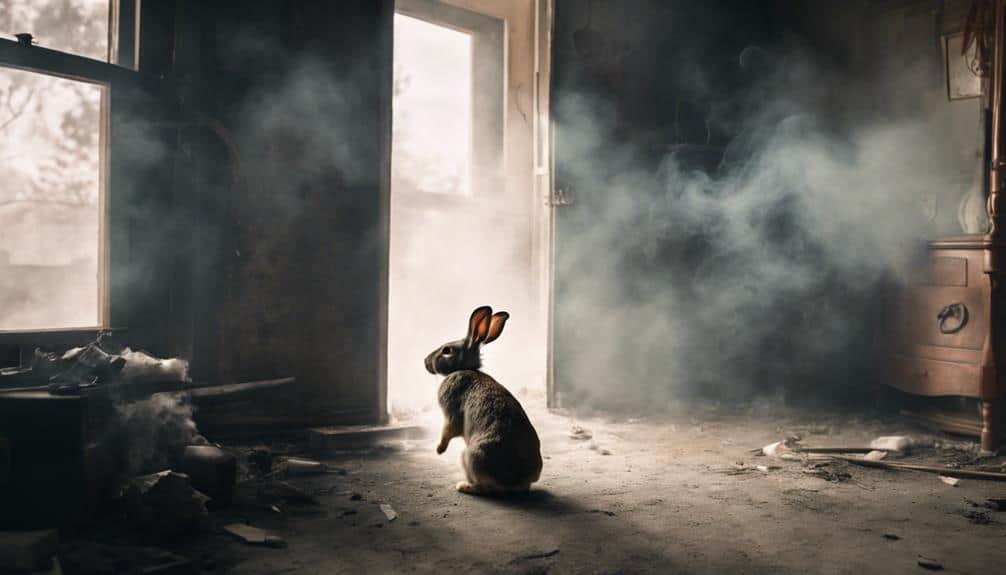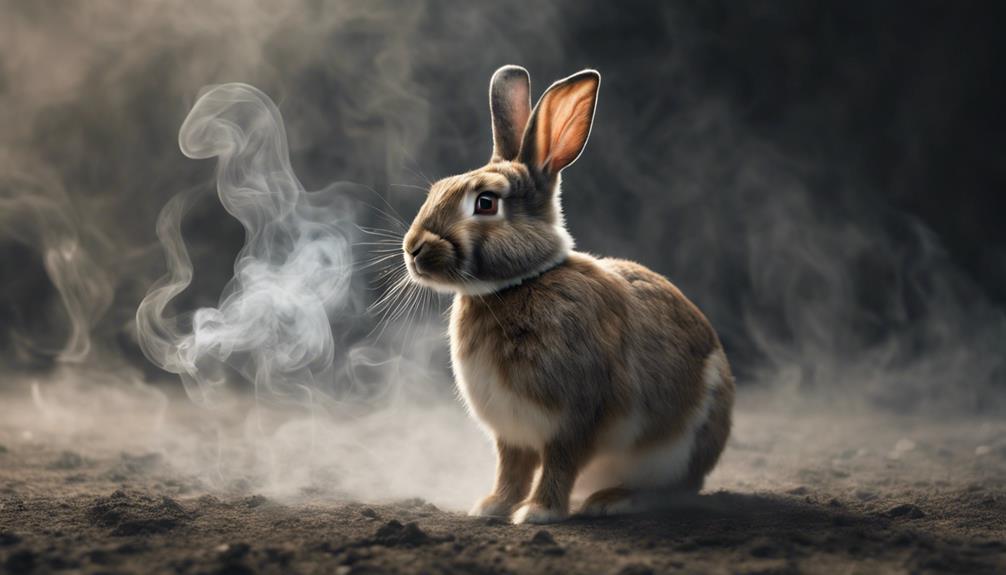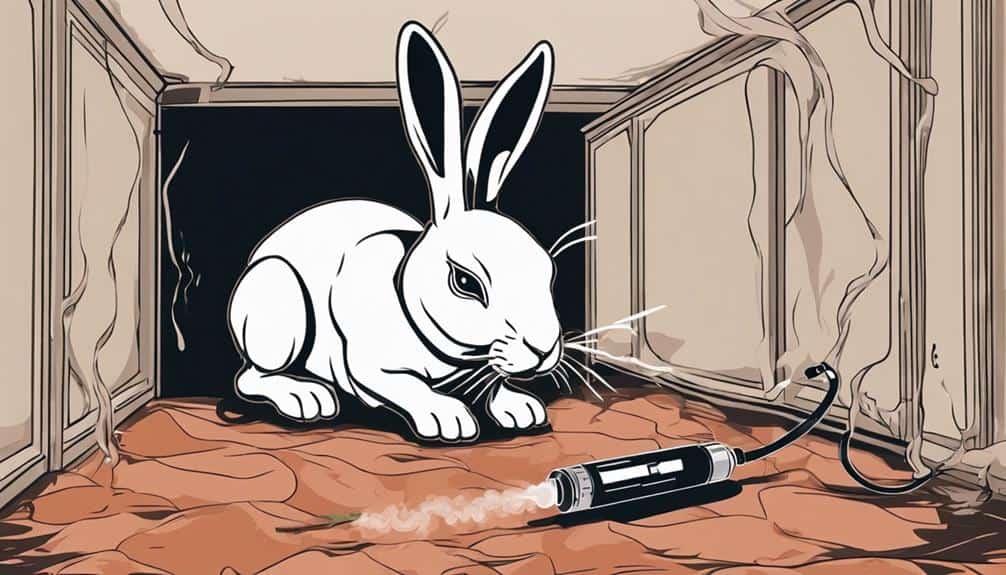Did you know that rabbits have highly sensitive respiratory systems, making them particularly vulnerable to the effects of smoke exposure?
While you may believe that smoking outside or in a separate room is sufficient, there are hidden dangers that could still impact your fluffy companion.
Consider the implications of smoke residue on their fur and surroundings, as well as the potential long-term health consequences.
Making informed decisions regarding your rabbit's environment is essential for their overall well-being.
Contents
- 1 Key Takeaways
- 2 Health Risks of Smoke Exposure in Rabbits
- 3 Impact on Rabbit Respiratory System
- 4 Cardiovascular Effects of Smoke on Rabbits
- 5 Smoking and Rabbit Cancer Risk
- 6 Considerations for E-Cigarette Vapor Exposure
- 7 Does Smoke Exposure Cause Respiratory Problems in Rabbits?
- 8 Frequently Asked Questions
- 9 Conclusion
Key Takeaways
- Smoke exposure harms rabbits' respiratory and cardiovascular health.
- Passive smoking leads to cancer risks and worsens existing health issues.
- E-cigarette vapor is toxic to rabbits and can be fatal if ingested.
- Preventing smoke and vapor exposure is crucial for rabbits' well-being.
Health Risks of Smoke Exposure in Rabbits

When rabbits are exposed to smoke, they're at risk of developing various health issues such as respiratory problems, diarrhea, and vomiting. Indoor rabbits face greater risks from passive smoking due to their respiratory sensitivity.
Secondhand smoke can lead to cardiac issues in rabbits due to their heightened sensitivity to air toxins. These clinical issues arising in rabbits from smoke exposure can be challenging to treat effectively, requiring prompt attention to prevent further complications.
For rabbits with pre-existing conditions like kidney failure, smoke exposure can worsen arterial thickening, having a major impact on their health. Hence, it's important to keep rabbits away from environments where smoking occurs to safeguard their well-being.
Impact on Rabbit Respiratory System
Exposure to smoke can have detrimental effects on the respiratory system of rabbits, leading to irritations, inflammations, and impaired breathing. When rabbits are exposed to smoke, they inhale toxic chemicals that can irritate their delicate respiratory tracts, causing issues such as coughing, sneezing, and difficulty breathing.
Passive smoking, where rabbits are near smokers, can be particularly harmful, as it can lead to impaired breathing and weaken their natural defenses against infections. The irritants in secondhand smoke can also exacerbate existing respiratory problems in rabbits, making them more susceptible to respiratory infections.
Additionally, the ammonia from urine in rabbit enclosures can interact with the smoke particles, intensifying the irritation in their airways. It's important to prevent rabbits from being around smoke to protect their respiratory health and overall well-being.
Cardiovascular Effects of Smoke on Rabbits

Research indicates that smoking can elevate aortic elastase activity in rabbits, potentially impacting their cardiovascular health. Cigarette-exposed rabbits exhibit markedly higher levels of aortic elastase compared to control groups, which may have implications for abdominal aortic aneurysm growth and rupture risk.
Secondhand smoke exposure is also known to affect the cardiovascular health of rabbits. The toxins found in secondhand and thirdhand smoke can pose serious risks to rabbits, including an increased risk of squamous skin disease and respiratory issues.
It's important to understand the potential harm that smoke exposure can have on rabbits' cardiovascular systems. Further research is necessary to fully comprehend the extent of the impact and to develop strategies to mitigate these risks effectively.
Smoking and Rabbit Cancer Risk
Smoking markedly increases the risk of lung cancers in rabbits, primarily attributed to uterine tumors. Exposure to secondhand smoke can also result in respiratory problems, diarrhea, and vomiting in rabbits. These symptoms may initially go unnoticed, leading to a decline in the rabbit's health before diagnosis.
Additionally, rabbits exposed to passive smoking are susceptible to developing cardiac issues due to their respiratory sensitivity. Clinical complications arising from secondhand smoke exposure can pose challenges in effectively treating rabbits, making prevention essential.
Lung cancer is a significant concern in rabbits exposed to smoke, emphasizing the importance of maintaining a smoke-free environment for these sensitive animals. To safeguard your rabbit's health and reduce the risk of cancer and other smoke-related illnesses, it's crucial to keep them away from smoking environments and guarantee they aren't exposed to passive smoking, which can have detrimental effects on their well-being.
Considerations for E-Cigarette Vapor Exposure

Considering the risks associated with e-cigarette vapor exposure, it's essential to understand how this can impact the health of your rabbit. E-cigarette vapor can contain harmful nicotine that poses serious health risks to pets like rabbits. Ingesting e-cigarette liquid can be fatal for rabbits if they accidentally consume it, leading to severe consequences. Deaths in pets, including rabbits, have been reported due to ingesting e-cigarette liquid, emphasizing the importance of keeping these substances away from pets. While e-cigarettes may lack some harmful chemicals found in traditional cigarettes, they still pose risks to pets due to their nicotine content. It's vital to prevent rabbits from being exposed to e-cigarette vapor to safeguard their health and well-being.
- Toxic Residue: E-cigarette vapor leaves behind toxic residue that can harm your rabbit if ingested or inhaled.
- Nicotine Content: The nicotine content in e-cigarette vapor can be extremely hazardous to the health of your rabbit.
- Accidental Ingestion: Prevent accidental ingestion of e-cigarette liquid by rabbits to avoid potentially fatal consequences.
Does Smoke Exposure Cause Respiratory Problems in Rabbits?
Smoke exposure can lead to common respiratory problems in rabbits. Their delicate respiratory systems are susceptible to irritation from smoke particles, leading to issues like sneezing, coughing, and difficulty breathing. It is important to keep rabbits in a smoke-free environment to prevent potential health problems.
Frequently Asked Questions
Is the Smell of Smoke Bad for Rabbits?
Breathing in the smell of smoke can be harmful to rabbits. It affects air quality and respiratory health, exposing them to environmental toxins. Protect your pet by keeping them away from secondhand smoke and indoor pollutants.
Are Rabbits Affected by Smoke?
If you wonder about rabbits and smoke, remember their health effects. Smoke affects them greatly, causing behavioral changes and long-term consequences. Environmental impact is serious. Protect your furry friends; keep them away from smoke.
Are Rabbits Sensitive to Cigarette Smoke?
You should avoid exposing rabbits to cigarette smoke due to their sensitivity. Health risks, behavior changes, and respiratory issues can arise. Secondhand smoke can harm rabbits' health, leading to challenging clinical problems. Protect their well-being and avoid environmental impact.
Are Rabbits Afraid of Smoke?
If smoke is near, rabbits may feel anxious due to its effects on their respiratory health. Protect your furry friend by keeping them away from smoke. Remember, smoke can lead to breathing issues and stress for rabbits.
Conclusion
To sum up, if you want your rabbits to have a hoppy and healthy life, it's best to keep them far away from smoke. Remember, a smoke-free environment is crucial for their well-being.
So, let's make certain our furry friends don't have to hare about the dangers of smoke exposure. It's time to paws and prioritize their health by keeping the air clean and smoke-free for our beloved bunnies.






